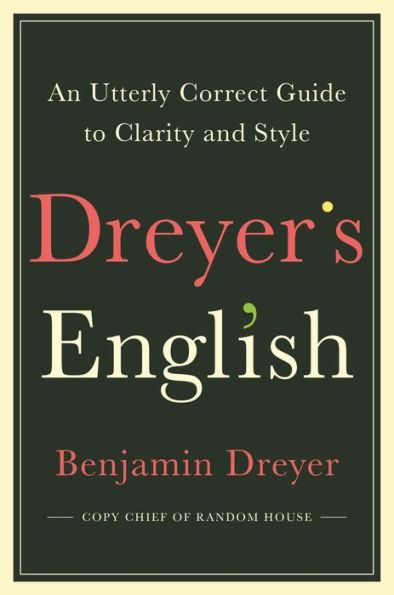
I once asked Benjamin Dreyer for professional advice. Deep in the mire of copyediting, stymied by some recondite problem with which I was getting, I felt, no clarity from the usually clarion Chicago Manual of Style, I cried out for assistance via Twitter — what Dreyer refers to, in his delightful book Dreyer’s English, as “that agora of the twenty-first century.” The response came within minutes, and while I do not remember the specific nature of the problem, or indeed the solution, I know that the answer was crisply decisive, cheerful, and undeniably authoritative. Editorial light had been summoned, and darkness dispelled.
 Dreyer is either, depending on whom you ask, a magisterial editor and vice president at Random House who has a lively Twitter following, or a Twitter superstar who happens also to be a book editor of long and honorable standing. By either formulation he is a man of unerring good taste and judgment, and his book is a tonic, witty, and insightful guide to usage that is practically guaranteed to improve any reader’s writing.
Dreyer is either, depending on whom you ask, a magisterial editor and vice president at Random House who has a lively Twitter following, or a Twitter superstar who happens also to be a book editor of long and honorable standing. By either formulation he is a man of unerring good taste and judgment, and his book is a tonic, witty, and insightful guide to usage that is practically guaranteed to improve any reader’s writing.
Those who care about such things know that usage types, like their near cousins in lexicography, exist on a rough continuum from the “descriptivists,” who feel that guidelines and rules are meant only to describe a language that is always slippery with change, and “prescriptivists,” who feel that the guidelines and rules are there to prescribe proper usage and consistency in writing and thought. (The late Bill Walsh, of the Washington Post, was a prescriptivist; Kory Stamper, until recently the popular face of Merriam-Webster, is a descriptivist.) At their extremes, the former are often accused of slopping over into anything-goes relativism, the latter of prissy, out-of-touch pedantry.
Dreyer occupies a middle position on this curve; he is flexible enough to discard a nonsensical rule when he sees fit, but he is stubborn enough to dig in against usages that he considers slipshod. He thus displays what I consider a sensible common-law approach to adjudication, eager to impose consistency but operating always with an ear tuned to the music of prose. He observes that categorically refusing to end a sentence with a preposition “is a fine rule to observe if you want to sound as if you learned English on your native Mars,” but he is also capable of saying that “only godless savages eschew the series comma.” He considers himself a writer’s best friend — “try to preserve the author’s style, if he is an author and has a style” is his maxim, courtesy of Wolcott Gibbs — but he is also capable of saying that “writers should get over themselves.”
 In the course of navigating these issues, Dreyer engages with such famous (well, famous in some circles, anyway) textual cruxes like the opening sentence of Norman Mailer’s Harlot’s Ghost, with its dangling modifier, a Law & Order shot that features “the eternally incorrect headline ‘EASTSIDE RAPIST CAPTURED,'” and Raymond Chandler’s defiant cry that “when I split an infinitive … I split it so it will stay split.” He issues rulings with authority: mea culpa is set in roman type, n’est-ce pas in italics; “impact” as a verb, no, “liaise” as a verb, OK; “hopefully” and “myriad” are almost always acceptable, contra generations of sticklers.
In the course of navigating these issues, Dreyer engages with such famous (well, famous in some circles, anyway) textual cruxes like the opening sentence of Norman Mailer’s Harlot’s Ghost, with its dangling modifier, a Law & Order shot that features “the eternally incorrect headline ‘EASTSIDE RAPIST CAPTURED,'” and Raymond Chandler’s defiant cry that “when I split an infinitive … I split it so it will stay split.” He issues rulings with authority: mea culpa is set in roman type, n’est-ce pas in italics; “impact” as a verb, no, “liaise” as a verb, OK; “hopefully” and “myriad” are almost always acceptable, contra generations of sticklers.
More important, a quarter century spent working with the cream of American letters has endowed Dreyer with a phenomenally acute sense of how the mechanics of sentence structure affect the valence and timbre of prose. Dreyer is pro-sentence fragment, except when they are “used to establish a sort of hairy, sweaty, unbathed masculine narrative voice, and … end up sounding like asthma.” He notes that parallel constructions sometimes result in “a certain tautness in slightly stilted prose that I find almost viscerally thrilling” — an insight that I find particularly apposite. And his advice is often subtle to the point of delicacy such has his suggestion that writers “avoid echoing similar-sounding words: a ‘twilight’ five words away from a ‘light,’ for instance,” to say nothing of inadvertent rhymes.
He is also a repository of peerless cocktail party-fodder. An intentional comic misspelling is called a “cacography.” The Germans have a word — Deppenapostrophe, which means “idiot’s comma” — for the hapless use of what we call a grocer’s comma (APPLE’S 3 FOR $1.00). “Percolate” refers not the bubbling of heated water “but the filtering of a liquid (e.g., water) through a solid (e.g., ground coffee).” And so on.
 Acerbic, bawdy, Jewish, fond of old movies and musical theatre — Dreyer’s personality shines through the pedagogy. He is an engaging raconteur, with an eye for the absurd and a command of bountiful quotations, which he deploys skillfully in support of his premises. His prose is heavily ornamented with little asides, delivered in footnotes, which convey with marvelous efficiency the parallel tracks of a quicksilver mind at work, with the body of the text criticizing, explaining, discoursing, while the notes provide a sort of Greek chorus of jokes, qualifications, and trivia.
Acerbic, bawdy, Jewish, fond of old movies and musical theatre — Dreyer’s personality shines through the pedagogy. He is an engaging raconteur, with an eye for the absurd and a command of bountiful quotations, which he deploys skillfully in support of his premises. His prose is heavily ornamented with little asides, delivered in footnotes, which convey with marvelous efficiency the parallel tracks of a quicksilver mind at work, with the body of the text criticizing, explaining, discoursing, while the notes provide a sort of Greek chorus of jokes, qualifications, and trivia.
Best of all is the brio with which Dreyer engages his subject. The book makes thinking about writing and language seem fun, snazzy, witty. And beneath the apercus and allusions lurks the heart of a devout believer in the importance of literature. “Once upon a time,” Dreyer relates, “I typed out in full Shirley Jackson’s story ‘The Renegade,’ to see whether doing so might make me better appreciate how beautifully constructed the story was. It did.” This mixture of the passionate and the acidic is deeply appealing; concealing a finely tuned aesthetic under an scrim of asperity is the apex, the belle ideal, of a certain strain of New York intellectualism. Later in the book, Dreyer confesses that he sometimes reads “old books as much for the pleasure of their old-fashioned stylistic oddities as for their actual comment,” adding, “We all have to make our own fun.” Indeed we do.
[Published by Random House, January 22, 2019. 288 pages, $25.00 hardcover]